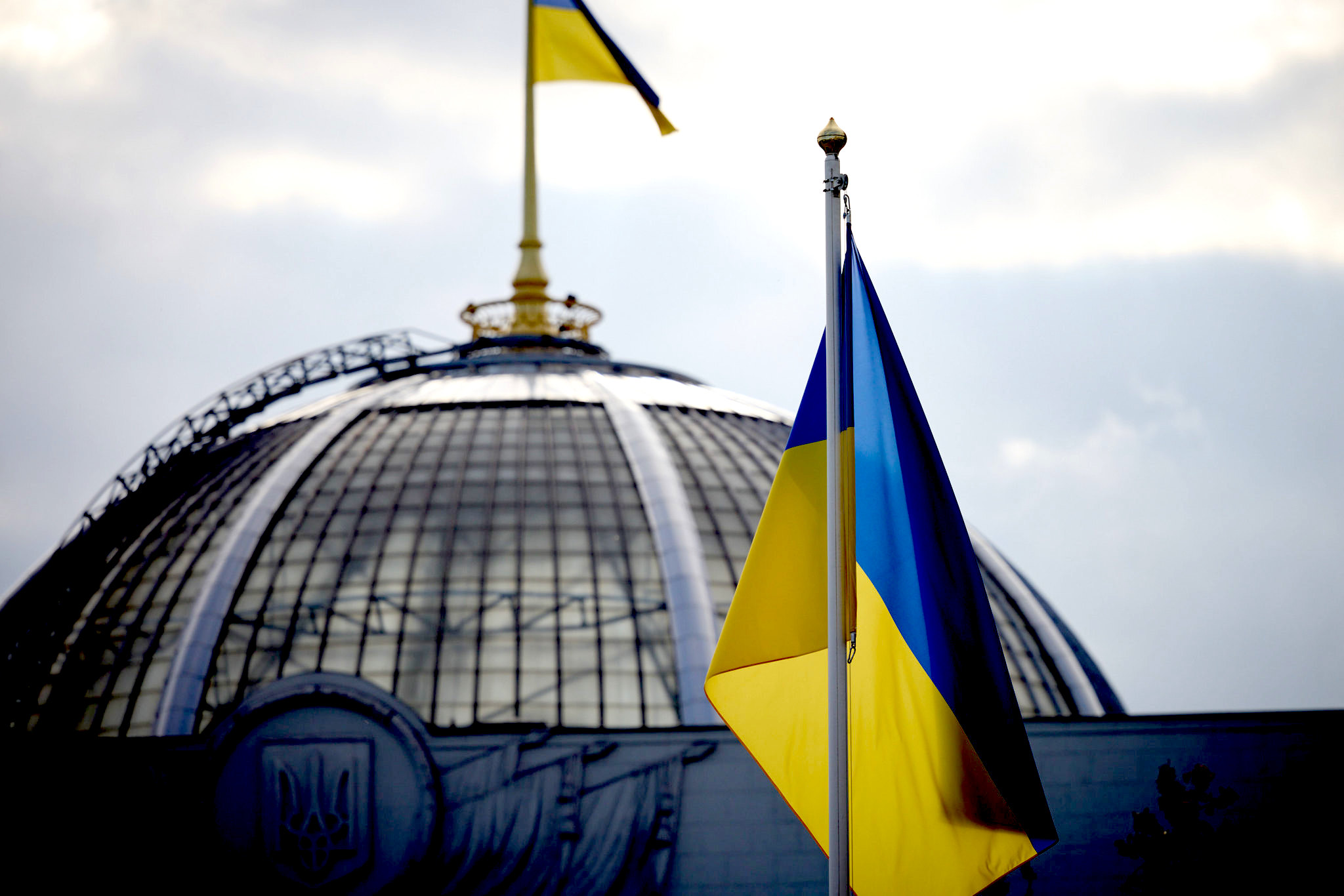Georgii Sandul surveys the anti-labor effects of laws passed in the last year and notes that they do not bring the country any closer to joining the E.U.

Ukraine Parliament building. (President Of Ukraine, Flickr, Public domain)
By Georgii Sandul
International Politics and Society
 We, Ukrainians, are all living in a state of war. Along with Russia’s full-scale invasion in February 2022, Ukrainians are facing another threat: since March we have also experienced a full-scale attack on the labour rights of all working people in Ukraine.
We, Ukrainians, are all living in a state of war. Along with Russia’s full-scale invasion in February 2022, Ukrainians are facing another threat: since March we have also experienced a full-scale attack on the labour rights of all working people in Ukraine.
This is, unfortunately, one of the dominant narratives of the present day, unabated in recent years.
Clearly, after Feb. 24, 2022, the labour sector could not remain in its former state and had to change and undergo reforms. Nobody in their right mind would insist on the same working conditions as before the war and the full rights and guarantees they were entitled to up till then.
For entirely logical reasons, practices employed before the onset of the war — such as strikes and peaceful assembly — are now prohibited.
In March, at the very start of the war, the Verkhovna Rada (Ukrainian Parliament) passed a law — On the Organisation of Labour Relations During Martial Law — which unfortunately meant that certain extreme forms of liberalisation of labour rights became a legal reality.
Undermining Labor Rights of Those on Frontlines
This law, in fact, contained very few provisions conducive to strengthening the defence capabilities of the state during a war. However, it did include several provisions which fundamentally undermined the labour rights of those who had been working at the frontlines since the start of the invasion.
[Related: Ukraine Continues Wartime Attack on Worker Benefits and Ukraine Uses Russian Invasion to Wreck Workers’ Rights]
In particular, the proposed “suspension” of the employment contract. According to this concept, employees are not formally dismissed, but in reality, no longer work for or receive a salary from their company.
By allowing employers to unilaterally cancel the provisions of collective agreements without justification, this law destroyed the foundations of trade union work.
Such laws became the unpleasant reality for hundreds and thousands of people actively fighting for democratic change in their workplaces.
Employment relations began to be suspended for no reason at all, even in companies of strategic importance for the defence of Ukraine.
Another scandalous legal provision was the law “On Amending Certain Legislative Acts of Ukraine on Optimisation of Employment Relations” adopted in July 2022, which released employers from the obligation to pay an average salary to employees mobilised for the defence of their country.

Ukraine’s President Volodymyr Zelensky presenting an award to a soldier near the front line in the Kharkiv Oblast, Sept. 14, 2022. (President.gov.ua, CC BY 4.0, Wikimedia Commons)
In addition, in summer 2022, the Verkhovna Rada passed a law substantially reducing the labour rights of those working for small and medium-sized enterprises (up to 250 employees). This law established a separate regime to regulate labour relations in these enterprises, where an individual employment contract was defined as the main document regulating labour relations.
In other words, the employee had to personally negotiate all the specifics of their employment directly with the employer. Yet labour law was created precisely for the collective protection of workers because it is impossible to effectively negotiate all employment terms and conditions with massive corporations and the like.
Support CN’s
Winter Fund Drive!
Another innovation adopted during martial law was the introduction into domestic practice of “non-fixed-hour contracts,” known in the West as “zero-hour contracts.”
This type of contract does not define standard working hours and the employee becomes a “call-to-action person.” According to the authors of the document, the law is intended to regulate the work of freelancers, but in fact it is applicable to any type of worker.
The Workers’ Struggle Started Before the War
It should be pointed out here that the aforementioned changes blatantly contradict Ukraine’s ambitions of European integration. Article 296 of the Association Agreement between Ukraine and the EU states:
“a Party shall not weaken or reduce the environmental or labour protection afforded by its laws to encourage trade or investment, by waiving or otherwise derogating from, or offering to waive or otherwise derogate from, its laws, regulations or standards, in a manner affecting trade or investment between the Parties.”
It is clear that the new changes to national legislation do not bring our warring country any closer to becoming a member of the European family.

The EU flag being brought into the hall of the Verkhovna Rada on July 1, 2022. (President.gov.ua, CC BY 4.0, Wikimedia Commons)
Due to the lack of a single coordinated state policy on labour in Ukraine, highly negative regulations are mixed with the positive results of the ongoing labour reform.
For example, one relatively positive law that was adopted provided safeguards to prevent bullying (harassment) in the workplace.
It is clear that the focus should not only be on the legislative aspect but also on the practical one. Institutional failure to effectively protect labour rights was common in Ukraine even before the war.
The lack of due justice and the attempt to paralyse the labour inspectorate in defiance of the conventions of the International Labour Organisation had led to impunity for unscrupulous employers even in peacetime.
Ukraine was renowned, for instance, for such disgraceful and very widespread phenomena as informal employment. In 2021, according to various estimates, 1-in-5 Ukrainians worked in the informal sector, with no employment rights and no safeguards.
Yet these are just a few of the challenges the Ukrainian government faces in the field of labour protection. In fact, the struggle for labour rights in Ukraine started long before the onset of open warfare with an external enemy. Ensuring a decent life for every employed person in Ukraine needs a common front of governmental institutions who must be aware of their social function, employers focused on retaining labour during and after the war, and trade unions who must drive not only the protection of existing but also the achievement of new rights for wage earners.
Establishing decent labour conditions in accordance with European and international standards, as well as developing effective state policy on the protection of labour rights, must become the cornerstone for guaranteeing both national security during wartime and the physical availability of a workforce for post-war reconstruction.
The war cannot be used to justify stripping workers of their rights.
Georgii Sandul is a lawyer and the director of the NGO Labour Initiatives.
This article is from International Politics and Society.
The views expressed are solely those of the author and may or may not reflect those of Consortium News.
Support CN’s
Winter Fund Drive!
Donate securely by credit card or check by clicking the red button:


Labor rights are under attack everywhere—that includes America.
The workers at Starbucks formed unions—and the CEO ignored the NLRB and its laws and closes those stores, or fires employees.
Corporate Wars are killing the concept of a democracy, but as the corporations become stronger, it looks like workers are losing. On the other hand, as so many in America lack money for rising rents or enough food—-I am wondering if Biden and his war will have to return a focus on an imploding America—which even several hundred years later has still failed at making that,”…More Perfect Union…..”
Of course, while the carrot of EU membership is used to keep the masses in line, the elites (both in Ukraine and outside) no doubt recognize the advantages of eliminating as many labor protections as possible. While the war rages on, not only is there a market for weapons sales, but a source of cheap labor that actual EU member countries can take advantage of.
Well, welcome to neoliberalism and finance capitalism. This is one of the main reasons the US triggered the war in your country.
This sucks…but war will be used as justification to marginalize labor rights, not to mention all kinds of other rights. Isn’t it always?
There was no “full scale invasion” by Russia in February of 2022. There was a Strategic Military Operation to liberate the autonomous regions of Eastern Ukraine from the bombing and slaughter campaign imposed on them by the Kiev regime. To the extent the SMO has become a full-scale invasion, that is a direct result of U.S./NATO actions in further provoking Russia.
I’m sorry your labor rights are under attack, but you don’t seem to care about the human beings in eastern Ukraine who are literally under life-threatening attack.
Agreed, it was far from ‘full scale’, deploying only a small fraction of Russia’s armies. And it was just before Ukraine was about to launch a large attack on the Donbas, so you could call it a pre-emptive strike to prevent even more casualties.